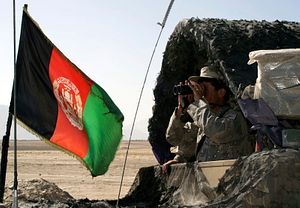Afghanistan’s spy chief, Rahmatullah Nabil, resigned just as President Ashraf Ghani was returning from a brief trip to Pakistan to attend the Heart of Asia conference. The conference was widely seen as an opportunity for Ghani to start rebuilding relations with Pakistan and work toward restarting peace talks with the Taliban. But, it seems Ghani’s diplomatic maneuvers in Islamabad were not appreciated by all back home.
Nabil, who has led the National Directorate of Security (NDS) since 2013 (and previously from 2010 to 2012) warned in an angry Facebook post against trusting Pakistan and accused Islamabad of “clear interference” in Afghanistan’s internal affairs. He also said that Ghani was surrendering “Afghanistan’s 5,000 year history to Pakistan’s 60-year history.”
In his official resignation, as reported by TOLOnews, Nabil said he was grateful for the opportunity to lead the NDS for five years but points to a divergence of opinion on policy matters. “Unfortunately over recent months,” he wrote, “the working environment became a little bit difficult for me as I did not share views on a number of policies, this also undermined the environment of trust in my working area.”
Interestingly, Amrullah Saleh, who ran the NDS under former President Hamid Karzai from 2004 to 2010, resigned for the same reason. According to an interview with Reuters, Saleh called plans to negotiate with the Taliban a “disgrace.”
At its heart, Nabil’s resignation–which Ghani accepted–is as much a protest against Pakistan’s meddling in Afghanistan as it is a backlash against Ghani for entertaining peace talks with the Taliban.
At the Heart of Asia conference, Ghani directed a few remarks at the Pakistani Prime Minister Nawaz Sharif which acknowledged the belief in Afghanistan that Pakistan does not have the best of intentions. But he went on to say “Your words would go a very long way to assure us in this regard and that opens up the possibility for a sustained dialogue among us.”
The conference ended with the affirmation of participants that they support an Afghan-led peace process. Salahuddin Rabbani, the Afghan Foreign Minister, said that the United States, China and Pakistan are willing to work with Afghanistan:
“Peace and reconciliation process was one of the main items discussed in today’s [Wednesday] meetings and certainly all of the countries in the region, particularly our allies – in this case US and China and of course Pakistan – have expressed their willingness to work with Afghanistan on peace and reconciliation process and we very much hope that this effort will result in a result-oriented peace process where we will see some positive moves in the coming weeks.”
Pakistan has long been accused of supporting the Taliban, either tacitly or directly. The evidence is overwhelming that Taliban use Pakistani territory to plan and launch attacks in Afghanistan while culpability for that arrangement remains hotly debated. Quetta is a veritable hub of Taliban activity. Mullah Mansour, the current leader of the group, was reportedly injured in a shootout at home of the Taliban’s chief judicial official, Qazi Haybatullah, in a Quetta suburb. The New York Times said that “many leaders of the Afghan Taliban live openly [in Quetta].”
For this reason, it’s also widely believed that any negotiated peace with the Taliban starts first with Pakistan’s buy-in. That was the logic behind Ghani’s initial detente with Pakistan and the logic behind continued engagement despite setbacks. In August, Ghani was piqued by a series of attacks and lashed out at Pakistan, saying “We don’t want Pakistan to bring the Taliban to peace talks, but to stop the Taliban’s activities on their soil.”
During the Heart of Asia conference, Taliban attacked the Kandahar airport. The death toll is now up to 50.
Ghani appointed Massoud Andarabi, the NDS deputy, as active chief in the interim. While security continues to deteriorate in the country, Afghanistan has been without a defense minister for 200 days (as of December 10) or a little over six months. Mohammed Masoom Stanekzai has been acting defense minister since May 24, while multiple nominees to the post have been rejected.
































